|
Global equities were mixed for the week and for September. Investors had to contend with renewed geopolitical concerns regarding the Korean peninsula and in Europe as the Catalan secessionist movement look to divorce themselves from Spain. Election results in Germany and New Zealand were assessed. The upcoming snap election in Japan also was parsed for a likely outcome. Angela Merkel in Germany — albeit with a smaller majority than anticipated — won but will need to form a coalition to have full control.
In New Zealand the shape of the new government is still unknown. Both National and Labour have put their chances at 50-50 of forming a coalition government with third party New Zealand First. By Friday afternoon, neither the National leader (and current Prime Minister) Bill English nor Labour leader Jacinda Ardern had spoken to the key third party crucial for forming a government.
In Fed Chair Janet Yellen's speech to the National Association for Business Economists she said that policymakers ought to be careful of "moving too gradually" on monetary policy despite "significant uncertainties" over inflation dynamics. She said that monetary policymakers may need to recalibrate their expectations to adjust for transitory and idiosyncratic factors that have weighed on the Fed's goal of 2 percent inflation, despite low unemployment.
She acknowledged that "some key assumptions underlying the Fed's outlook could be wrong in ways that imply that inflation will remain low for longer than currently projected." While Ms Yellen acknowledged that a "gradual" path to monetary policy tightening was prudent, she cautioned against waiting too long to raise interest rates again — underscoring the Fed's signal from its latest meeting that another rate rise may be in the cards before the end of 2017.
| |
|
2016 |
2017 |
% Change |
|
Index |
Dec 31 |
Sep 22 |
Sep 29 |
Week |
Sep |
2017 |
| Asia/Pacific |
|
|
|
|
|
|
|
| Australia |
All Ordinaries |
5719.1 |
5740.6 |
5744.9 |
0.1% |
-0.5% |
0.4% |
| Japan |
Nikkei 225 |
19114.4 |
20296.5 |
20356.3 |
0.3% |
3.6% |
6.5% |
|
Topix |
1518.61 |
1664.61 |
1674.8 |
0.6% |
3.5% |
10.3% |
| Hong Kong |
Hang Seng |
22000.6 |
27880.5 |
27554.3 |
-1.2% |
-1.5% |
25.2% |
| S. Korea |
Kospi |
2026.5 |
2388.7 |
2394.5 |
0.2% |
1.3% |
18.2% |
| Singapore |
STI |
2880.8 |
3220.3 |
3219.9 |
0.0% |
-1.7% |
11.8% |
| China |
Shanghai Composite |
3103.6 |
3352.5 |
3348.9 |
-0.1% |
-0.4% |
7.9% |
|
|
|
|
|
|
|
|
| India |
Sensex 30 |
26626.5 |
31922.44 |
31283.7 |
-2.0% |
-1.4% |
17.5% |
| Indonesia |
Jakarta Composite |
5296.7 |
5911.7 |
5900.9 |
-0.2% |
0.6% |
11.4% |
| Malaysia |
KLCI |
1641.7 |
1771.0 |
1755.6 |
-0.9% |
-1.0% |
6.9% |
| Philippines |
PSEi |
6840.6 |
8281.3 |
8171.4 |
-1.3% |
2.7% |
19.5% |
| Taiwan |
Taiex |
9253.5 |
10449.7 |
10329.9 |
-1.1% |
-2.4% |
11.6% |
| Thailand |
SET |
1542.9 |
1659.1 |
1673.2 |
0.9% |
3.5% |
8.4% |
|
|
|
|
|
|
|
|
| Europe |
|
|
|
|
|
|
|
| UK |
FTSE 100 |
7142.8 |
7310.6 |
7372.8 |
0.8% |
-0.8% |
3.2% |
| France |
CAC |
4862.3 |
5281.3 |
5329.8 |
0.9% |
4.8% |
9.6% |
| Germany |
XETRA DAX |
11481.1 |
12592.4 |
12828.9 |
1.9% |
6.4% |
11.7% |
| Italy |
FTSE MIB |
19234.6 |
22530.8 |
22696.3 |
0.7% |
4.7% |
18.0% |
| Spain |
IBEX 35 |
9352.1 |
10305.0 |
10381.5 |
0.7% |
0.8% |
11.0% |
| Sweden |
OMX Stockholm 30 |
1517.2 |
1600.8 |
1637.8 |
2.3% |
5.9% |
8.0% |
| Switzerland |
SMI |
8219.9 |
9136.7 |
9157.5 |
0.2% |
2.6% |
11.4% |
|
|
|
|
|
|
|
|
| North America |
|
|
|
|
|
|
|
| United States |
Dow |
19762.6 |
22349.59 |
22405.1 |
0.2% |
2.1% |
13.4% |
|
NASDAQ |
5383.1 |
6426.9 |
6496.0 |
1.1% |
1.0% |
20.7% |
|
S&P 500 |
2238.8 |
2502.2 |
2519.4 |
0.7% |
1.9% |
12.5% |
| Canada |
S&P/TSX Comp. |
15287.6 |
15454.2 |
15634.9 |
1.2% |
2.8% |
2.3% |
| Mexico |
Bolsa |
45642.9 |
50313.5 |
50346.060 |
0.1% |
-1.7% |
10.9% |
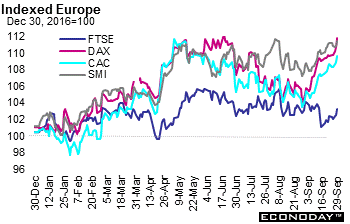 European equities advanced across the board for the week. Gains ranged from 0.2 percent (SMI) to 1.9 percent (DAX). On the month, only the FTSE retreated losing 0.8 percent. The DAX advanced the most — up 6.4 percent on the month. The OMX added 5.9 percent, the CAC advanced 4.8 percent and the MIB was 4.7 percent higher. The recent upward trend in Europe brought the markets to their highest level in nearly two months. A weakening euro helped lift shares. However, uncertainty over the Catalan crisis weighed on Spanish stocks. Catalonia's leader made clear that his government is determined to go ahead with a Sunday vote on independence but Madrid insisted the referendum is illegal. European equities advanced across the board for the week. Gains ranged from 0.2 percent (SMI) to 1.9 percent (DAX). On the month, only the FTSE retreated losing 0.8 percent. The DAX advanced the most — up 6.4 percent on the month. The OMX added 5.9 percent, the CAC advanced 4.8 percent and the MIB was 4.7 percent higher. The recent upward trend in Europe brought the markets to their highest level in nearly two months. A weakening euro helped lift shares. However, uncertainty over the Catalan crisis weighed on Spanish stocks. Catalonia's leader made clear that his government is determined to go ahead with a Sunday vote on independence but Madrid insisted the referendum is illegal.
European economic data proved mixed at the end of the trading week. German unemployment tumbled to a record low, but German retail sales disappointed along with the Ifo survey. Traders also continued to digest the U.S. tax reform plan and attempted to assess the path forward for the proposal.
In the UK, disappointing growth data raised doubts as to whether the Bank of England would raise rates at its November meeting. Recent hawkish rhetoric from the Bank of England has supported the pound sterling. This in turn has hampered British shares, many of which source their revenues overseas.
The Bank of England celebrated its 2 decades of policy independence during the week. In a major speech from BoE governor Mark Carney he said that although the Bank of England holds significant sway in influencing inflation, it can't solve broader challenges and is limited in its ability to soften any blow from Brexit. "While carefully circumscribed independence is highly effective in delivering price and financial stability, [the BoE] cannot deliver lasting prosperity and it cannot solve broader societal challenges".
Mr Carney said it is a point worth "emphasizing because in recent years a host of issues have been laid at the door of the Bank of England from housing affordability to poor productivity." The BoE has made this case repeatedly, particularly following the Brexit vote since the separation from the EU could cause difficult-to-predict fluctuations in the British economy. "Calls for the Bank to solve these challenges ignore the Bank's carefully defined objectives. And they confuse independence with omnipotence," he said.
On Monday, European Central Bank President Mario Draghi said that he is growing increasingly confident that inflation will rise back to its target of just below 2 percent — but patience is still needed. Draghi singled out currency volatility as a source of uncertainty which requires monitoring and argued that the economy still needed to absorb slack, requiring "ample" ECB accommodation. "Overall, we are becoming more confident that inflation will eventually head to levels in line with our inflation aim, but we also know that a very substantial degree of monetary accommodation is still needed for the upward inflation path to materialize," Draghi told the European Parliament's committee on economic affairs. With the Eurozone economy now growing for the 17th straight quarter, the ECB is expected to reduce stimulus for 2018, even if inflation remains below the ECB's near 2 percent target.
 Equities were mostly lower last week thanks to continuing geopolitical concerns as the dialogue between North Korea and the U.S. escalated yet again. In Japan, Prime Minister Abe announced a snap election — the lower house of the Diet (Japan's parliament) was dissolved and October 22 was announced as the day of the election. The national election in New Zealand was held last weekend (September 23) and the provisional results gave the National party, which has led a centrist government since 2008, 58 seats in a 120-seat parliament, while the centre-left Labour party garnered 45 seats. Labour refused to concede and may try to form a government. Both parties will have to form a coalition with one of the minor parties to achieve a majority. A decision must be made prior to October 12 when final election writs are required to be received by the Governor-General. Equities were mostly lower last week thanks to continuing geopolitical concerns as the dialogue between North Korea and the U.S. escalated yet again. In Japan, Prime Minister Abe announced a snap election — the lower house of the Diet (Japan's parliament) was dissolved and October 22 was announced as the day of the election. The national election in New Zealand was held last weekend (September 23) and the provisional results gave the National party, which has led a centrist government since 2008, 58 seats in a 120-seat parliament, while the centre-left Labour party garnered 45 seats. Labour refused to concede and may try to form a government. Both parties will have to form a coalition with one of the minor parties to achieve a majority. A decision must be made prior to October 12 when final election writs are required to be received by the Governor-General.
Equities for the week were mostly lower. However, the All Ordinaries edged up 0.1 percent and the Nikkei and Topix were up 0.3 percent and 0.6 percent respectively. The Hang Seng dropped 1.2 percent and the Shanghai Composite was 0.1 percent lower prior to National Holiday when the Shanghai will be closed all of next week and the Hang Seng on Monday and Thursday. The Sensex was 2.0 percent lower. For the month of September, the Nikkei (3.6 percent), Topix and SET (both 3.5 percent) were the best performers. The Hang Seng was down on the month for the first time in 2017, losing 1.5 percent while the STI was 1.7 percent lower.
Japan's Prime Minister Shinzo Abe called a snap general election as he seeks to secure power to the 2020 Tokyo Olympics and beyond. Mr Abe dissolved the lower house of the Japanese Diet (Parliament) on September 28th and will hold the election on October 22. The election will decide whether Japan continues with stimulative economic policies and whether Mr Abe has the political strength to revise Japan's pacifist constitution. Mr Abe is starting with a massive opinion poll lead, but the election is full of risks with Tokyo governor Yuriko Koike declaring she will lead a new Party of Hope in opposition to the prime minister. Mr Abe said he would raise the consumption tax from 8 to 10 percent in 2019 as planned but redirect part of the revenue to provide free childcare for 3 to 5 year olds.
Chinese equities rose on hopes that next month's twice-a-decade Communist Party Congress will likely make state-owned enterprise reform a priority. China's focus is now on the upcoming Communist Party Congress which begins October 18. It is a once every five years meeting where new leaders are appointed and the government's key political and economic initiatives are laid out, though details are usually not announced until much later. Traders also will be closely watching upcoming economic data for September culminating in third quarter gross domestic product on October 19. Worries that China's robust economic growth may be starting to fade had triggered some selling during the week.
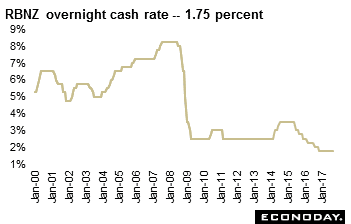 As widely expected, the Reserve Bank of New Zealand kept its Official Cash Rate (OCR) unchanged at 1.75 percent where it has been since November 2016. In his statement, acting governor Grant Spencer said that monetary policy will remain accommodative for a considerable period. Numerous uncertainties remain and policy may need to adjust accordingly. Regarding the domestic economy, Spencer said that the trade-weighted exchange rate has eased slightly since the August statement. However, a lower New Zealand dollar would help to increase tradables inflation and deliver more balanced growth. As widely expected, the Reserve Bank of New Zealand kept its Official Cash Rate (OCR) unchanged at 1.75 percent where it has been since November 2016. In his statement, acting governor Grant Spencer said that monetary policy will remain accommodative for a considerable period. Numerous uncertainties remain and policy may need to adjust accordingly. Regarding the domestic economy, Spencer said that the trade-weighted exchange rate has eased slightly since the August statement. However, a lower New Zealand dollar would help to increase tradables inflation and deliver more balanced growth.
GDP in the June quarter grew as anticipated following relative weakness in the previous two quarters. While exports recovered, construction was weaker than expected. Growth is projected to maintain its current pace going forward, supported by accommodative monetary policy, population growth, elevated terms of trade and fiscal stimulus. It was also noted that house price inflation continued to moderate and was expected to continue due to loan-to-value ratio restrictions, affordability constraints and a tightening in credit conditions. However, there still remains a risk of resurgence in prices given population growth and resource constraints in the construction sector.
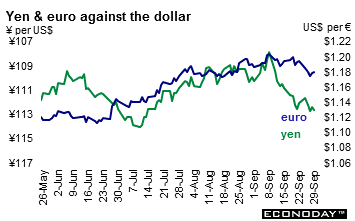 The U.S. dollar was up against all of its major counterparts with the exception of the Swiss franc. The U.S. currency gained against the yen, euro, pound sterling and the Canadian and Australian dollars. One reason for the dollar's performance is the expectation of another interest rate increase before the end of the year. This combined with the administration's tax-cut plan, have dominated markets for most of the week. However, watchers remain skeptical about the dollar's long term outlook, citing the long time it will take for a tax plan to actually become legislation. The U.S. dollar was up against all of its major counterparts with the exception of the Swiss franc. The U.S. currency gained against the yen, euro, pound sterling and the Canadian and Australian dollars. One reason for the dollar's performance is the expectation of another interest rate increase before the end of the year. This combined with the administration's tax-cut plan, have dominated markets for most of the week. However, watchers remain skeptical about the dollar's long term outlook, citing the long time it will take for a tax plan to actually become legislation.
Elsewhere, the euro declined for the first month since February this year as the results of the German elections that prompted some profit-taking into a double-digit rally in the single currency this year. Eurozone inflation data are a key risk event for the currency markets. Inflation in the Eurozone was expected to be 1.6 percent for September compared with 1.5 percent in August — however it remained at 1.5 percent on the year.
Analysts said the recent retrenchment in sterling has as much to do with investor caution over the slow progress of Brexit negotiations as the comments made by US Federal Reserve chief Janet Yellen this week. Even as Ms Yellen's comments on the need for gradual monetary tightening have prompted the markets to ramp up their bets on a December rate rise, skepticism is forming in some quarters over whether BoE governor Mark Carney will really raise rates this year.
|
|
2016 |
2017 |
% Change |
|
|
Dec 30 |
Sep 22 |
Sep 29 |
Week |
2017 |
| U.S. $ per currency |
|
|
|
|
|
|
| Australia |
A$ |
0.7215 |
0.796 |
0.784 |
-1.5% |
8.7% |
| New Zealand |
NZ$ |
0.6948 |
0.733 |
0.722 |
-1.4% |
4.0% |
| Canada |
C$ |
0.7443 |
0.811 |
0.801 |
-1.1% |
7.7% |
| Eurozone |
euro (€) |
1.0534 |
1.194 |
1.182 |
-1.1% |
12.2% |
| UK |
pound sterling (£) |
1.2333 |
1.352 |
1.341 |
-0.8% |
8.7% |
|
|
|
|
|
|
|
| Currency per U.S. $ |
|
|
|
|
|
|
| China |
yuan |
6.9450 |
6.590 |
6.653 |
-0.9% |
4.4% |
| Hong Kong |
HK$* |
7.7533 |
7.810 |
7.812 |
0.0% |
-0.7% |
| India |
rupee |
67.9238 |
64.800 |
65.280 |
-0.7% |
4.0% |
| Japan |
yen |
116.8100 |
112.090 |
112.540 |
-0.4% |
3.8% |
| Malaysia |
ringgit |
4.4862 |
4.198 |
4.221 |
-0.5% |
6.3% |
| Singapore |
Singapore $ |
1.4465 |
1.346 |
1.356 |
-0.8% |
6.6% |
| South Korea |
won |
1205.8300 |
1136.650 |
1145.440 |
-0.8% |
5.3% |
| Taiwan |
Taiwan $ |
32.3260 |
30.171 |
30.324 |
-0.5% |
6.6% |
| Thailand |
baht |
35.8100 |
33.079 |
33.307 |
-0.7% |
7.5% |
| Switzerland |
Swiss franc |
1.0174 |
0.9705 |
0.9684 |
0.2% |
5.1% |
| *Pegged to U.S. dollar |
|
|
|
|
|
|
| Source: Bloomberg |
|
|
|
|
|
|
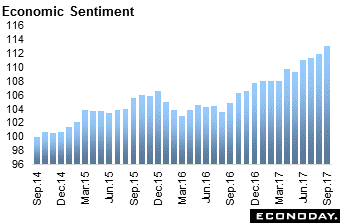 The September EU Commission's measure of economic sentiment (ESI) increased for the fourth months. At 113.0, the end of quarter reading was up more than a full point from its unrevised August reading and at a new post-Great Recession high. Morale improved in all of its main sectors. Industry recorded a 1.6 point increase to 6.6 while the consumer sector was up 0.3 points at minus 1.2 and services 0.2 points firmer at 15.3. Additionally, construction advanced 1.6 points to minus 1.7 and retail 1.4 points to 3.0. With the exception of retail, all of these sub-indices are at multi-year peaks. All of the larger four member states posted increases in their respective national ESIs. France was up 0.4 points at 111.2, Germany 0.5 points at 112.4, Italy 1.8 points at 110.9 and Spain 0.6 points at 109.9. The September EU Commission's measure of economic sentiment (ESI) increased for the fourth months. At 113.0, the end of quarter reading was up more than a full point from its unrevised August reading and at a new post-Great Recession high. Morale improved in all of its main sectors. Industry recorded a 1.6 point increase to 6.6 while the consumer sector was up 0.3 points at minus 1.2 and services 0.2 points firmer at 15.3. Additionally, construction advanced 1.6 points to minus 1.7 and retail 1.4 points to 3.0. With the exception of retail, all of these sub-indices are at multi-year peaks. All of the larger four member states posted increases in their respective national ESIs. France was up 0.4 points at 111.2, Germany 0.5 points at 112.4, Italy 1.8 points at 110.9 and Spain 0.6 points at 109.9.
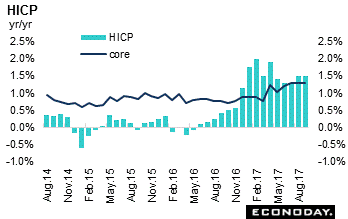 September flash harmonized index of consumer prices was unchanged at an annual increase of 1.5 percent. The headline would have been weaker but for a boost from some of the more volatile subsectors. The annual rate for food, alcohol and tobacco jumped 0.5 percentage points to 1.9 percent although energy dipped a tick to 3.9 percent. Consequently, the narrowest core measure which excludes both these categories slipped from 1.2 percent in August to 1.1 percent, equaling its lowest reading since May. Omitting just energy and unprocessed food, the rate held steady at 1.3 percent. Inflation in non-energy industrial goods was similarly flat at 0.5 percent but services were off 0.1 percentage points at 1.5 percent. September flash harmonized index of consumer prices was unchanged at an annual increase of 1.5 percent. The headline would have been weaker but for a boost from some of the more volatile subsectors. The annual rate for food, alcohol and tobacco jumped 0.5 percentage points to 1.9 percent although energy dipped a tick to 3.9 percent. Consequently, the narrowest core measure which excludes both these categories slipped from 1.2 percent in August to 1.1 percent, equaling its lowest reading since May. Omitting just energy and unprocessed food, the rate held steady at 1.3 percent. Inflation in non-energy industrial goods was similarly flat at 0.5 percent but services were off 0.1 percentage points at 1.5 percent.
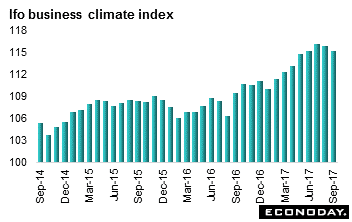 September Ifo overall sentiment reading was 115.2, down 0.5 points of its downwardly revised August reading and matched its lowest mark since May. The third quarter average (115.7) was still 1.4 points above the second quarter mean. The decline reflected modest falls in both components. Current conditions were down more than a full point to 123.6, their second consecutive decrease, but were still 9 points above their level a year ago. Expectations slipped just 0.4 points to 107.4 unwinding most of August's 0.5 point gain. They stand nearly 3 points higher than in September 2016. September Ifo overall sentiment reading was 115.2, down 0.5 points of its downwardly revised August reading and matched its lowest mark since May. The third quarter average (115.7) was still 1.4 points above the second quarter mean. The decline reflected modest falls in both components. Current conditions were down more than a full point to 123.6, their second consecutive decrease, but were still 9 points above their level a year ago. Expectations slipped just 0.4 points to 107.4 unwinding most of August's 0.5 point gain. They stand nearly 3 points higher than in September 2016.
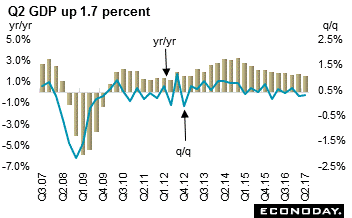 Final estimate of second quarter gross domestic product was unrevised with a quarterly increase of 0.3 percent. However, revisions to the back data left real GDP expanding a downwardly revised 1.5 percent on the year while first quarter total output was revised up to a 0.3 percent quarterly rate. Business investment was upwardly revised to 0.5 percent rise from the start of the year. Household consumption (0.2 percent) was similarly a little firmer although this was still only half the first quarter rate and easily its worst performance in more than two years. Inventories subtracted significantly such that gross fixed capital formation knocked 0.3 percentage points off the quarterly change in total output. However, the drag here was offset by a more positive real trade balance which, with exports marked up to 1.7 percent and imports shaded to 0.2 percent, added 0.4 percentage points. Final estimate of second quarter gross domestic product was unrevised with a quarterly increase of 0.3 percent. However, revisions to the back data left real GDP expanding a downwardly revised 1.5 percent on the year while first quarter total output was revised up to a 0.3 percent quarterly rate. Business investment was upwardly revised to 0.5 percent rise from the start of the year. Household consumption (0.2 percent) was similarly a little firmer although this was still only half the first quarter rate and easily its worst performance in more than two years. Inventories subtracted significantly such that gross fixed capital formation knocked 0.3 percentage points off the quarterly change in total output. However, the drag here was offset by a more positive real trade balance which, with exports marked up to 1.7 percent and imports shaded to 0.2 percent, added 0.4 percentage points.
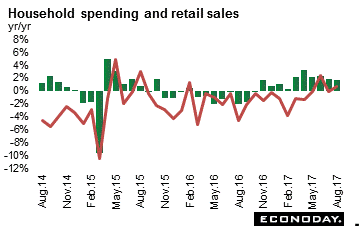 Both household spending and retail sales were higher in August. August household spending was up 0.6 percent when compared with the same month a year ago. The slower than expected growth was attributable to a 12.5 percent drop in education. That decline combined with a 7.4 percent drop in annual medical care spending led to the less than anticipated increase. On the plus side, furniture & household utensils were 3.8 percent higher while transportation & communication spending bounced an annual 7.1 percent higher. August retail sales were up 1.7 percent on the year after increasing 1.8 percent in July. Among the categories comprising retail sales, auto sales jumped 8.3 percent and machinery & equipment were 4.6 percent higher. On the down side, general merchandise retreated 0.3 percent and non-store retailers were down 0.5 percent. Fuel sales increased 1.4 percent while medicine & toiletry stores sales were up 5.4 percent. Both household spending and retail sales were higher in August. August household spending was up 0.6 percent when compared with the same month a year ago. The slower than expected growth was attributable to a 12.5 percent drop in education. That decline combined with a 7.4 percent drop in annual medical care spending led to the less than anticipated increase. On the plus side, furniture & household utensils were 3.8 percent higher while transportation & communication spending bounced an annual 7.1 percent higher. August retail sales were up 1.7 percent on the year after increasing 1.8 percent in July. Among the categories comprising retail sales, auto sales jumped 8.3 percent and machinery & equipment were 4.6 percent higher. On the down side, general merchandise retreated 0.3 percent and non-store retailers were down 0.5 percent. Fuel sales increased 1.4 percent while medicine & toiletry stores sales were up 5.4 percent.
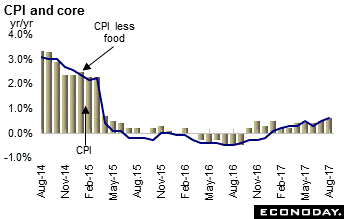 August consumer prices were up 0.2 percent on the month and 0.7 percent from a year ago. Excluding fresh food, the CPI core was also up 0.7 percent on the year. Monthly core CPI edged up 0.1 percent. The CPI less both food and energy was up 0.2 percent on the year and 0.1 percent on the month. The rise in the core inflation rate, which is the focus of the Bank of Japan's 2 percent inflation target, was supported by 5.2 percent growth in the cost of fuel, light & water and 1.8 percent growth in the cost of medical care from the prior year. August consumer prices were up 0.2 percent on the month and 0.7 percent from a year ago. Excluding fresh food, the CPI core was also up 0.7 percent on the year. Monthly core CPI edged up 0.1 percent. The CPI less both food and energy was up 0.2 percent on the year and 0.1 percent on the month. The rise in the core inflation rate, which is the focus of the Bank of Japan's 2 percent inflation target, was supported by 5.2 percent growth in the cost of fuel, light & water and 1.8 percent growth in the cost of medical care from the prior year.
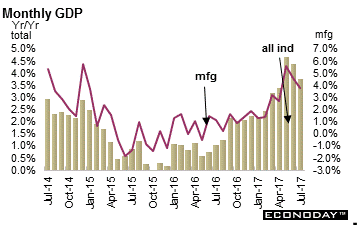 July monthly gross domestic product was unchanged on the month after increasing 0.3 percent in June. On the year, GDP was up 3.8 percent after rising 4.4 percent last time. However, the service sector recorded its second successive 0.2 percent monthly increase, largely reflecting a sizeable gain in wholesale trade (2.0 percent) but also a decent performance by professional, scientific & technical services (0.5 percent). By contrast, retail trade (down 0.1 percent) had a poor month as did finance & insurance (down 0.6 percent) and arts, entertainment & recreation (also down 0.6 percent). Goods producing industries posted a 0.5 percent monthly contraction, their first decline since February. Manufacturing (down 0.4 percent) struggled alongside and construction (down 0.5 percent) although this did follow a 1.7 percent bounce in June. Otherwise, there were declines in agriculture, forestry, fishing & hunting (0.4 percent) and mining, quarrying, & oil & gas extraction (1.2 percent) but utilities (1.7 percent) advanced. July monthly gross domestic product was unchanged on the month after increasing 0.3 percent in June. On the year, GDP was up 3.8 percent after rising 4.4 percent last time. However, the service sector recorded its second successive 0.2 percent monthly increase, largely reflecting a sizeable gain in wholesale trade (2.0 percent) but also a decent performance by professional, scientific & technical services (0.5 percent). By contrast, retail trade (down 0.1 percent) had a poor month as did finance & insurance (down 0.6 percent) and arts, entertainment & recreation (also down 0.6 percent). Goods producing industries posted a 0.5 percent monthly contraction, their first decline since February. Manufacturing (down 0.4 percent) struggled alongside and construction (down 0.5 percent) although this did follow a 1.7 percent bounce in June. Otherwise, there were declines in agriculture, forestry, fishing & hunting (0.4 percent) and mining, quarrying, & oil & gas extraction (1.2 percent) but utilities (1.7 percent) advanced.
Equities were mixed both for the week and September with geopolitical risks making investors cautious. Economic data also were mixed. The week was dominated by central bank speakers including Fed chair Janet Yellen and Bank of England governor Mark Carney. Investors continue to listen carefully to their comments.
Several key central bank policy announcements will be made during the week including the Reserve Banks of Australia and India and the European Central Bank. No change is expected in Australia. Given slowing growth in India and muted inflation, investors are looking for a cut from the RBI. And forward guidance is looked for from the ECB regarding its bond buying program. The week will see the release of global PMIs that will provide survey information about economic performance of both manufacturing and services in September. In Japan, the important Bank of Japan quarterly Tankan will be released. Canada and the U.S. release their respective employment reports at week's end.
| Central Bank activities |
|
| Oct 3 |
Australia |
Reserve Bank of Australia Monetary Policy Announcement |
| Oct 4 |
India |
Reserve Bank of India Monetary Policy Announcement |
| Oct 5 |
Eurozone |
European Central Bank Monetary Policy Announcement |
| |
|
|
| The following indicators will be released this week... |
| Europe |
|
|
| Oct 2 |
Eurozone |
Manufacturing PMI (September) |
|
|
Unemployment Rate (August) |
|
Germany |
Manufacturing PMI (September) |
|
France |
Manufacturing PMI (September) |
|
UK |
Manufacturing PMI (September) |
| Oct 3 |
Eurozone |
Producer Price Index (August) |
| Oct 4 |
Eurozone |
Composite PMI (September) |
|
|
Retail Sales (August) |
|
Germany |
Composite PMI (September) |
|
France |
Composite PMI (September) |
|
UK |
Services PMI (September) |
| Oct 6 |
Germany |
Manufacturing Orders (August) |
|
France |
Merchandise Trade (August) |
| |
|
|
| Asia Pacific |
|
|
| Oct 2 |
Japan |
Tankan Survey (Q3.2017) |
|
|
Manufacturing PMI (September) |
| Oct 3 |
India |
Manufacturing PMI (September) |
| Oct 4 |
Japan |
Services PMI (September) |
| Oct 5 |
Australia |
Retail Sales (August) |
|
|
Merchandise Trade Balance (August) |
| |
|
|
| Americas |
|
|
| Oct 5 |
Canada |
International Trade ( August) |
| Oct 6 |
Canada |
Labour Force Survey (September) |
Anne D Picker is the author of International Economic Indicators and Central Banks.
|

